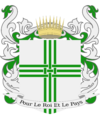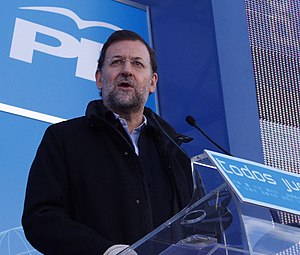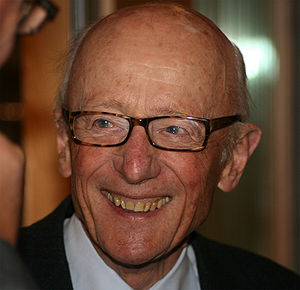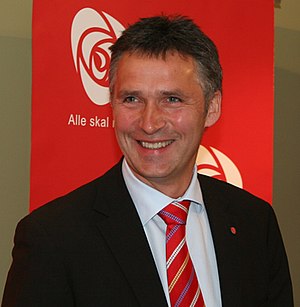Politics of Arcadia
The politics of Arcadia take place in the framework of a parliamentary, representative democratic constitutional monarchy. Executive power is formally exercised by the Prime Minister though the Advisory Council may have signifigant influence on policy, depending on the Prime Minister. Legislative power is vested in both the government and the legislature, the General Assembly and the Royal Diet, elected within a multi-party system in the Assembly and appointed by the Commonwealth legislatures in the Royal Diet. The judiciary is independent of the executive branch and the legislature.
Arcadia is ranked as TBD NUMBER by the TBD RANKER and guarantees civil liberties and freedoms within the country's commonwealths, but is ranked lower in the domestic territories which are criticized for being a method for the Arcadian government to control and occupy the territory.
Constitutional development
The Limitation of Powers Act, signed by King Enrico II on 14 May 1764, transformed Arcadia from being an absolute monarchy into a constitutional monarchy and effectively served as the first constitution. The 1764 act granted rights such as freedom of speech and rule of law, and an elected parliament checking the power of the nobility. Important developments in the formation fo the Arcadian government include:
- 1799: Post of Prime Minister established
- 1863: Parliamentarism has evolved since 1799 and entails that the cabinet must not have the parliament against it (an absence of mistrust, but an express of support is not necessary), and that the appointment by the Monarch is a formality when there is a clear parliamentary majority. In the event no party has a majority, the Monarch has the power to ask for each party to form a government. However, this system would fall out of practice in 1870 but would return in 1898.
- 1870: After the bloody Republican War, anti-monarchist factions prevail and abolish the monarchy and establish the First Republic of Arcadia under a new constitution.
- 1871: Universal male suffrage established by amendment.
- 1898: The First Republic is abolished and the Second Kingdom of Arcadia is re-established under the new constitution which establishes a parliamentary monarchy.
- 1913: Universal suffrage established
- 1923: A coup abolishes the monarchy and replaces it with the Second Republic of Arcadia, a dictatorial regime under Cezar Medeiros, who enacts a new constitution
- 1963: After years of slow liberalization, Silvio Faraghi drafts the fifth and current constitution of Arcadia, nearly identical to the third.
- 2002: The electoral system is switched to mixed method multimember, and an extra 100 seats are added to the General Court's lower house.
Executive branch
Arcadia is a constitutional monarchy, where the [[Monarch of Arcadia|Monarch of the Confederacy] has a mainly symbolic power. The Royal House is a branch of the princely family of TBD NAME, originally from TBD. The functions of the King, Louis IV, are mainly ceremonial, but he has influence as the symbol of national unity. Although the constitution of 1963 grants important appointment powers to the King, these are always exercised by the Advisory Council in the name of the King (King's Council, or cabinet). The King is also symbolically Supreme Commander of the Arcadian armed forces.
The Advisory Council is formally convened by the reigning monarch. The Advisory Council consists of a Prime Minister and his/her council, formally appointed by the Monarch. Parliamentarism has evolved since 1799 and entails that the cabinet must not have the parliament against it, and that the appointment by the Monarch is a formality so long as the party or coalition has a majority of seats. The council must have the confidence of the Arcadian legislative body, known as the Tribunal Général, or General Court. In practice, the Monarch will ask the leader of a parliamentary block that has a majority in the General Court to form a government. After elections resulting in no clear majority to any party or coalition, the leader of the largest party is asked to try and form a government, but must seek to find votes to support the government. If the largest party cannot form one, the second largest is asked, then the third, and so on and so forth. The outgoing government serves as a caretaker role that can only be removed for excessive incompetence or criminal acts. From the end of Democratization in the 1960s until 2002, most governments were one party governments under a first past the post system, usually revolving around the center-right Conservative Union or the center-left Democratic Party. In 2002, the constitution was amended to a multimember mixed method system, allowing for the formation of new paties. The collapse of the Conservative Union left deep tensions which prevented right wing parties from forming a coherent government during the 2002-2018 era, leaving the government in the hands of the left wing parties for nearly sixteen years. In 2018, right wing parties successfully struck a deal with the centrist Freedom Party, forming a center-right government for the first time since 1998.
The executive branch is divided into the following ministries, ranked by order of sucession.
- Office of the Prime Minister
- Ministry of Foreign Affairs
- Ministry of Defense
- Ministry of Justice
- Ministry of Commonwealth Affairs
- Directorate of Internal Security Affairs
- Ministry of Finance
- Ministry of the Interior
- Ministry of Commerce and Labor
- Ministry of Housing and Health
- Ministry of Infrastructure)
- Ministry of Education
- Ministry of Culture
Additionally, the following agency heads are considered to have Advisory Council Rank, but technically are not included, and therefore not in the line of succession unless designated as deputies.
- TBD EXTERNAL INTELLIGENCE
- DOMESTIC INTELLIGENCE
- Ambassador from the Confederacy to the UN
- Director of the Budget)
- Chair of the Economic Council
- Director of the Arcadian Space Exploration Agency
Governments 1966–1986
The Labor Party was the largest party in the General Court ever since the election of 1974 up to the 1986 election. Labor formed their first government in 1974 after the Confederalist Party lost, breaking the 8 year grip on power the Confederalists held in Arcadia. The peaceful transition from one party to another is often times called the "defining moment" of Arcadian democracy, and the moment in which the government became an enduring democracy.
Arcadia was ruled by Labor governments from 1974 to 1986, with the Confederalist Party in the minority for most of that time. Labor held a majority for the entire period of 1974 to 1982, and from 1982-1986 it held a teneous coalition wit the upstart Arcadian Socialist Party. The 1978-1982 term is considered to mark the last time a party held a commanding majority in the General Court. Governments since then have been under coalitions or have held majorities by less than 10 seats.
Governments 1986–2018
From 1986-1991 the government was under a teneous majority under a new party replacing the Confederalists, the Conservative Union, however the government lost the confidence of the Assembly after the Petrol Scandal and collapsed, triggering a snap election. The Conservatives returned to power under a tense union with the Anti-Corruption Party for the 1991-1994 term under the condition the Conservatives support a major anti-corruption bill. The embarassment of a loss to the scandal-ridden Conservatives was attributed to a lack of popularity in the left-wing policies of the Labor Party. Arcadian voters were, according to one political pundit at the time, "happy to let Labor win to reform the state and welfare system and showed their gratitude by voting out the party once their policies had been enacted". Other pundits pointed out the revisionism of the Medeiros regime by Labor as being politically unpopular. Labor's entire party leadership resigned, and the party rebranded itself as the Democratic Party, which was closer to a center-left than the more left wing politics of old. The party branded itself a social democratic pro-union capitalist party, as opposed to a democratic socialist party. The split between the "New Labor" and the "Syndicalist" wings would be blown open after the 2000 election.
After reforms in the electoral system in 2000, the government, consisting of the Conservative Union and Freedom Party, collapsed when several conservatives announced their intention to leave the party, denying the coalition a majority. This triggered a resignation of the entire government, and a snap election. In the snap election, the Conservative Union was shattered into three parties, none of which could unite and form a coalition. This handed over power to the Democratic Party, which also split into the Republican and New Democratic parties, both of which agreed to stay in a coalition until 2002. In 2002 the coalition stuck together and won a majority of seats. The coalition won again in the 2006 2010 elections, but became a minority government with the Freedom Party providing confidence and supply in 2010. This teneous coalition continued into the 2014 elections, when the personally popular Eloy Cuevas promised to serve another term, despite dissatisfaction with his party.
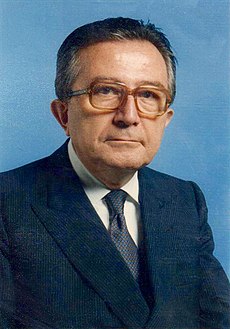
Current Cabinet
In the lead up to the2018 election, the incumbent New Democratic-Republican-Freedom held a minroity government under confidence and supply. However, just three months before the election the Freedom Party announced its intention to form a coalition with the Conservative Union and National Christian Union if one of those parties acquired the largest number of seats. The National Christian Union won 118 seats, overtaking the New Democrats as the largest party. Following convention, Cuevas and his government resigned and handed over power in June 2018. Both the Conservative Union and Freedom Party had campaigned on a change in government, gambling that public dissatisfaction would allow them to enter in as full partners in a coalition.
Legislative branch
Arcadia has a bicameral Parliament, elected in different manners. The legislative branch has wide sweeping powers, and is regarded as the most powerful institution in the country. The right to vote in legislative elections is guaranteed at 18 years old for all citizens or permanent residents who have lived in the country for more 25 years, but permanent residents only get to vote for local representatives, and not in the proportional vote.
The lower house is the General Assembly which is elected in a mixed electoral method. 300 seats are divided into 100 districts, with each district having 3 representatives. The districts are distributed to the commonwealths according to population. The representatives are elected through STV. A further 100 seats, adding up to 400 seats, are elected through a proportional method where party support translates directly into seats in the legislature. All 400 seats are up for election every 4 years. In the event of death, resignation, or otherwise permanent vacancy of the office, district seats hold special elections or the party appoints a replacement, unless there is less than 6 months until the next election, in which case the seat goes unfilled. If a representative is not dead, has not resigned, or is otherwise in office but may be permanently unable to preform their duties, either the next of kin or the head of government for their commonwealth may remove them from office.
The upper house is the Royal Diet which is not elected but is instead appointed by the commonwealth legislatures. Each commonwealth receives 6 representatives, each being nominated by a different method. 3 are nominated from the commonwealth lower house by first past the post anonymous ballot. Another is nominated by a nonpartisan AV method election, the fifth is nominated by the head of government of the commonwealth, and the sixth is nominated by the monarch, and must be nonpartisan. Commonwealth legislatures are required to confirm any nominee, and can only reject a nominee due to criminal record, failure to meet requirements, mental incompetence, nepotism, or electoral fraud. Members of the Diet serve for 8 years, with half of each commonwealth's delegation up for election every 4 years. Members of the Diet may be removed by their legislature, the Monarch, or by recall election.
Political parties and elections
Elections are to be held every four years on first full weekend of May. The most recent election was held in 2018. Elections may be held upon the death or resignation of a prime minister, and must be held upon the collapse of a coalition.
Political parties in Arcadia tend to evolve over time, a result of the proportionality system making parties much more fluid. Prior to the 2002 elections the country used a first past the post method of voting, making the country a two party system. With the advent of the current system, the Conservative Union all but collapsed into separate factions, making the 2002-2018 era a time of nearly unopposed left wing politics, as the Democratic Party split peacefully off into the New Democratic Party and Republican Party. However, right wing parties began to reunify into the Constitutionalist and National Christian Union parties, which were able to form a government in 2018, the first government since 2002 to not include the New Democrats or the Republicans.

Judicial branch
The Arcadian legal system is a mixture of customary law, civil law system, and common law traditions; the High Court renders advisory opinions to legislature when asked.
The regular courts include the district courts with 70 permanent judges, 5 per court, courts of appeal (court of second instance in most cases), city and commonwealth courts (court of first instance in most cases), and conciliation councils (court of first instance in most civil-code cases). Judges attached to the regular courts are appointed by the Monarch after nomination by the Prime Minister, who receives a list of candidates from the High Court with the approval of the Ministry of Justice.
The High Court itself consists of 13 justices and one Chancellor, who only votes in a tie. The justices are nominated in a similar way to regular judges.
Impeachment
Impeachment may be brought against Members of the Advisory Council, or of the High Court or of the General Court, for criminal offenses which they may have committed in their official capacity. Indictments are raised by the General Court and judged by five High Court justices and six lay judges.
Commonwealths
The mainland of Arcadia is divided into 13 commonwealths: TBD, TBD 2, TBD 3, TBD 4, TBD 5, TBD 6, TBD 7, TBD 8, TBD 9, TBD 10, TBD 11, TBD 12, AND TBD 13.
Commonwealths have local autonomy, guaranteed by the constitution. Commonwealths are subject to the oversight of a governor appointed by the Monarch on the advice of the Prime Minister, who receives candidates from the Ministry of Commonwealth Relations. Governors serve as a head of state type figure. Each commonwealth has a directly elected commonwealth legislature, led by a Speaker, who also serves as head of government for the commonwealth in 7 commonwealths. Other commonwealths have a variety of executive powers, but the Speaker-Minister model is the most common, with 7 commonwealths using the system. Matters falling within purview of the commonwealths include; upper secondary and vocational education, some culture, police powers, jails, some courts, local regulations, the creation of local electoral districts, and transport and social services.
The commonwealths are divided into several jurisdictions within their own borders, with a general regional and municipal level. The municipalities tend to be led by directly elected assemblies, which elect a board of aldermen and a mayor, in the South. Northern municipalities tend to be direct democracies and town hall governments. Western municipalities have a parliamentary system of government, where the city council elects a city government that is responsible for executive functions. Larger municipalities are also divided into municipal districts or city districts responsible for certain welfare and culture services. These districts are also headed by political assemblies elected by the citizens. Unlike commonwealths, municipalities are not guaranteed self government.
Domestic Territories
Arcadia administers three domestic territories which effectively are military occupation zones between settler ethnic-Arcadians and the local Koronan tribes which speak their own language and have their own religion, a form of paganism. This has resulted in the Arcadian-Koronan Conflicts.
